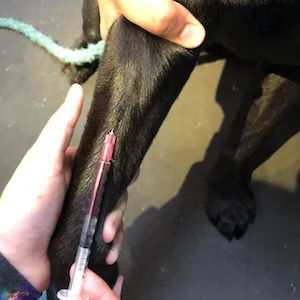Heartworm disease is a severe and potentially fatal condition affecting beloved pets across the United States and globally. Caused by foot-long worms residing in the heart, lungs, and associated blood vessels, it can lead to devastating lung disease, heart failure, and damage to other vital organs. Understanding the importance of Heartworm Medicine for both prevention and treatment is paramount for every pet owner committed to their animal’s long-term health. Proactive measures, including regular veterinary check-ups and consistent use of heartworm prevention medicine, are the most effective strategies to protect your furry companions from this pervasive threat.
Understanding Heartworm Disease: What Every Pet Owner Needs to Know
Heartworms (Dirofilaria immitis) are parasitic nematodes that primarily affect dogs, cats, and ferrets, but can also be found in wild canids like wolves, coyotes, and foxes. These worms cause severe health issues by impacting the cardiovascular system.
The transmission of heartworm disease relies entirely on mosquitoes. Adult female heartworms living in an infected animal produce microscopic offspring called microfilaria, which circulate in the bloodstream. When a mosquito bites an infected animal, it ingests these microfilaria. Over 10 to 14 days, inside the mosquito, the microfilaria develop into infective larvae. When this infected mosquito then bites another susceptible animal, the larvae are deposited onto the skin and enter the new host through the bite wound. Once inside, it takes approximately six months for these larvae to mature into sexually reproductive adult heartworms.
The disease manifests differently across species. Dogs are natural hosts, meaning heartworms mature, mate, and produce offspring readily within their bodies, potentially leading to hundreds of worms if untreated. This causes lasting damage to the heart, lungs, and arteries. Cats, conversely, are atypical hosts; most worms do not survive to adulthood, and affected cats typically harbor only one to three worms. However, even immature worms can cause significant damage, leading to a condition known as Heartworm Associated Respiratory Disease (HARD). Ferrets are highly susceptible, similar to dogs, but like cats, a small number of worms can cause devastating disease due to their tiny heart size.
Heartworm Disease in Dogs: Prevention and Treatment with Medicine
Dogs are the primary host for heartworms, and without intervention, the number of worms can escalate significantly. This parasitic burden severely impacts their cardiovascular system, leading to long-term health complications even after the parasites are gone. Early detection and treatment, alongside robust prevention strategies using heartworm medicine for dogs, are crucial.
In the early stages, many dogs exhibit no noticeable symptoms. However, as the infection progresses, a mild persistent cough, reluctance to exercise, fatigue after moderate activity, decreased appetite, and weight loss may become apparent. Advanced stages can lead to heart failure and a swollen abdomen due to fluid accumulation. A life-threatening condition called caval syndrome can occur with large numbers of worms, marked by sudden labored breathing, pale gums, and dark urine, requiring emergency surgical intervention.
 Foot-long heartworms impacting a dog's heart and lungs
Foot-long heartworms impacting a dog's heart and lungs
If your dog tests positive for heartworms, a veterinarian will typically recommend a structured treatment protocol. The first step involves confirming the diagnosis with additional tests, given the expense and complexity of treatment. Exercise must be severely restricted immediately, as physical exertion exacerbates heart and lung damage caused by the worms. Your dog’s condition may need to be stabilized with appropriate therapy, especially in severe cases. The primary treatment for adult heartworms in dogs is a series of melarsomine injections, administered in a veterinary hospital. This medication effectively kills adult worms, usually within one to three months. The American Heartworm Society provides comprehensive guidelines for this multi-step treatment, which often includes other medications to improve success rates and reduce side effects. Approximately nine months post-treatment, a follow-up heartworm test is performed to confirm the elimination of all worms. Continuous year-round heartworm prevention is then vital to prevent re-infection.
Heartworm Disease in Cats: Prevention is Key Since Treatment is Limited
Heartworm disease in cats presents a unique challenge compared to dogs. As atypical hosts, cats usually have fewer worms, and many infections may even resolve spontaneously, although this can still leave them with permanent respiratory system damage. Heartworms can also impact a cat’s immune system, causing symptoms like coughing, wheezing, and difficulty breathing. In some severe cases, worms may migrate to other organs, leading to neurological issues or sudden collapse.
Symptoms in cats can be subtle or dramatic, including coughing, asthma-like attacks, periodic vomiting, loss of appetite, or weight loss. Unfortunately, sudden collapse or even sudden death can be the first sign. Diagnosing heartworm in cats is more complex, often requiring a physical exam, X-rays, complete blood count, and various blood tests, possibly including an ultrasound.
 Veterinarian examining a cat during a check-up
Veterinarian examining a cat during a check-up
Crucially, there is no FDA-approved drug therapy for heartworm infection in cats, and the medication used for dogs is unsafe for them. Therefore, prevention is the only means of protecting cats. If a cat tests positive, veterinary care focuses on stabilizing the cat and managing symptoms. This may involve monitoring for spontaneous clearing of worms, administering small doses of prednisolone to reduce inflammation, or providing intensive care with intravenous fluids, antibiotics, and other supportive drugs in severe cases. Surgical removal of worms is occasionally an option. Consistent, monthly Heartgard medicine or similar preventives, available in spot-on or pill form, are essential for both indoor and outdoor cats to prevent new infections.
Heartworm Disease in Ferrets: Rapid Progression and Essential Prevention
Ferrets are highly susceptible to heartworm infection, exhibiting a dangerous combination of traits seen in both dogs and cats. They can harbor a significant number of worms, similar to dogs, yet even a single worm can cause severe disease due to their small heart size. The disease progresses rapidly in ferrets, making early detection and prevention critical.
Signs of heartworm disease in ferrets are often similar to those in dogs but develop more quickly. These include lethargy, open-mouth and/or rapid breathing, pale blue or muddy gum color, and coughing. Other symptoms can include fluid in the lungs, decreased appetite, weight loss, hind leg paralysis, and an enlarged abdomen. Dark-colored urine (bilirubinuria) is also common.
 A curious ferret looking out from behind a wooden fence
A curious ferret looking out from behind a wooden fence
Diagnosis in ferrets can be problematic, often requiring a physical exam, X-rays, ultrasound, complete blood count, and various blood tests to confirm the presence of worms. As with cats, there is no FDA-approved drug therapy for heartworm infection in ferrets, and the dog treatment drug is unsafe. Treatment focuses on stabilizing the ferret and managing symptoms, potentially involving hospitalization, intravenous fluids, medications for lung and heart symptoms, antibiotics, and general nursing care. In rare instances, surgical removal may be possible. Given their high susceptibility and the lack of approved treatment, consistent, year-round prevention with appropriate heartworm medicine for small dogs or ferret-specific preventives is imperative for all ferrets, whether indoor or outdoor.
Heartworm Testing: The First Step Before Medicine
Heartworm disease is a serious and progressive condition, emphasizing that early detection significantly improves a pet’s chances of recovery. Since there are often few or no early signs of infection, a heartworm test administered by a veterinarian is a critical diagnostic tool. This test typically requires a small blood sample from your pet and works by detecting the presence of heartworm proteins (antigens). Results are usually obtained quickly, either processed in-house or sent to a diagnostic laboratory. If a pet tests positive, further diagnostic tests may be ordered to assess the severity of the infection.
 A veterinary technician drawing a blood sample from a dog's leg
A veterinary technician drawing a blood sample from a dog's leg
Testing procedures and timing vary somewhat among species. For dogs, annual heartworm testing is recommended, often integrated into routine preventive care visits. Puppies under seven months can start on prevention without an initial test, but should be tested six months later, again at 12 months, and annually thereafter. Adult dogs over seven months not previously on prevention must be tested before starting medication, with follow-up tests at six and twelve months, then annually. Annual testing is crucial even for dogs on year-round prevention, as no medication is 100% effective, and missed or expelled doses can leave pets vulnerable.
For cats, heartworm infection is harder to detect due to their atypical host status. Veterinarians typically use both an antigen test (detecting adult worms) and an antibody test (detecting exposure to larvae). X-rays or ultrasound may also be used. Cats should be tested before starting prevention and re-tested as deemed appropriate by the veterinarian to monitor exposure and risk.
In ferrets, diagnosis can also be challenging. Veterinarians may recommend antigen testing combined with diagnostic imaging like echocardiography to identify worms in the heart.
Types of Heartworm Medicine: Prevention and Treatment Options
Heartworm prevention is a cornerstone of pet healthcare, and understanding the various heartworm medicine options is vital. These medications are a potent tool in protecting pets from a potentially fatal disease.
Yes, a prescription is required for heartworm medicine for puppies and all other pets. The U.S. Food and Drug Administration (FDA) mandates that heartworm preventives be used under the direction of a licensed veterinarian. This ensures proper diagnosis and safe administration. Before prescribing, veterinarians typically perform a heartworm test to confirm the pet is not already infected, as giving preventives to an infected animal can lead to rare but severe reactions. Testing is generally not necessary for very young puppies or kittens as it takes approximately six months for heartworms to mature sufficiently for detection.
 A veterinarian performing a health check on a dog
A veterinarian performing a health check on a dog
Monthly heartworm preventives, whether administered as a pill, a topical spot-on, or an injection, work by eliminating the immature (larval) stages of the heartworm parasite. This includes larvae deposited by mosquitoes and the subsequent developmental stage within the animal. It is critical to administer these medications strictly on schedule (monthly for oral/topical, or every 6-12 months for injectables) because heartworm larvae can molt into a juvenile adult stage in as little as 51 days, which is no longer effectively eliminated by preventives. Late administration can allow these immature larvae to mature, reducing the preventive’s efficacy.
Many heartworm preventives offer additional benefits, protecting against certain intestinal parasites like hookworms, roundworms, whipworms, and tapeworms. Some products even provide protection against external parasites such as fleas, ticks, and mites. It’s important to consult your veterinarian to determine the best multi-parasite prevention product for your pet’s specific needs.
Young animals should be started on heartworm prevention as early as the product label allows, typically no later than eight weeks of age for puppies and kittens, and when ferrets weigh at least two pounds. Dosage is based on body weight, not age, which means rapidly growing young animals may require dosage adjustments frequently. Regular veterinary visits ensure correct dosing and comprehensive health protection.
The American Heartworm Society strongly recommends year-round heartworm prevention for all pets, regardless of geographic location or climate. Heartworms have been diagnosed in all 50 states, and risk factors can vary dramatically due to climate changes, the presence of wildlife carriers, and infected mosquitoes entering homes. Even in northern states with cold winters or arid desert regions, microclimates and traveling pets pose a continuous risk.
Currently, there is no commercially available vaccine for heartworm disease. Prevention relies solely on the consistent and appropriate use of prescription preventive medications, which can be once-a-month chewables or topicals, or once or twice-a-year injections. Additionally, natural preventives are not FDA-approved and have not been proven effective or safe.
Addressing Concerns About Heartworm Medicine
It’s common for pet owners to have questions and concerns regarding heartworm medication and treatment protocols. Understanding these can help ensure your pet receives the best possible care.
If you have missed doses of your dog’s heartworm preventive, you must consult your veterinarian immediately. They will likely recommend restarting the monthly preventive and retesting your dog approximately six months later. This re-testing period is crucial because heartworms must be around seven months old before they can be reliably diagnosed by current tests.
Expired heartworm medication should never be used. The expiration date guarantees the product’s effectiveness and safety, established through rigorous testing mandated by the FDA. Using expired medication carries the risk that it may no longer be potent enough to prevent infection or could have undergone deterioration, making it unsafe.
If your dog was treated for heartworm disease but still tests positive several months later, it doesn’t necessarily mean the treatment failed. Adult worms can continue to die for over a month following melarsomine injections, and it can take longer for the heartworm antigen to be completely cleared from some dogs. The American Heartworm Society protocol often involves three injections, and sometimes a single course may not eliminate all worms. In such cases, your veterinarian will likely recommend rechecking the antigen status after another two to three months before considering a second treatment course.
If your veterinarian recommends a series of injections, hospitalization, pain medication, and laboratory work to treat your dog’s heartworms, they are recommending the best and most effective course of action. Melarsomine is the only FDA-approved drug for treating adult heartworm infection in dogs and must be administered by injection in a veterinary hospital. While there are risks, most adult worms die quickly, and complications can be minimized by strictly adhering to post-treatment cage rest and exercise restriction. The American Heartworm Society also recommends administering a heartworm preventive for two months prior to melarsomine treatment to prevent new infections and reduce the number of microfilaria, making the overall treatment more effective and safer.
Conclusion
Heartworm disease is a severe and persistent threat to the health of dogs, cats, and ferrets. While the disease manifests differently across species and treatment options vary, the fundamental message remains consistent: prevention is incomparably safer, less stressful, and more cost-effective than treating an established infection. Consistent, year-round use of FDA-approved heartworm medicine, prescribed and guided by your veterinarian, is the most effective way to safeguard your beloved pets. Remember that regular annual testing, even for pets on prevention, is vital to ensure the program’s efficacy. Consult your veterinarian regularly to discuss the most appropriate heartworm medicine for dogs and other pets, tailored to their specific needs and local risk factors, ensuring they live long, healthy, and heartworm-free lives.
